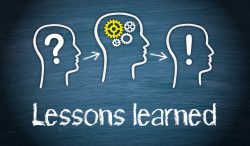Behavioral Economics Report Card
September 2, 2019 ~ Written by: W.B. “Bud” Kirchner
Approx. Read Time: 5 Minutes
“Comparison is the death of joy.” – Mark Twain
Lessons From Behavioral Economics
On the back of a recent article that summarized “10 Lessons from Behavioral Economics” (#1) – it quickly became evident just how many of the key issues we have covered in our own articles.
With this in mind, we went back to see what had been “missed” as per author Shahram Heshmat Ph.D. The following headings reflect his list and our Business Brain Model links to coverage of these topics. Several have been addressed in more than one article, so references have been limited.
The following are what the author refers to as “the hidden forces of behavioral economics that shape our choices” and the “choices people make that determine in part the quality of life”:
- “Incentive matters”
- “The forces of supply and demand”
- “The power of luck”
- “Money is not everything”
- “The Law of Diminishing Sensitivity”
- “Social vs. Market norms”
- “Fairness concerns”
- “Sunk cost”
- “Aversion to loss”
- “Preferences are fickle”
In the context of ‘above and beyond’, below are additional works on behavioral economics as follows:
- How Did I Get Here from There?
- Thinking Errors: Part One – Is your Radar set to Detect Cognitive Traps?
- How Do You Interpret the World
- Daniel Kahneman Meets Dalai Lama
- Fulcrums + Levers = Strong Business
- Am I Being All That I Can Be
Other Topics
We have written 85 blogs since 2015. In addition to behavioral economics, other topics include:
- Background
- Values
- Decision Making
- Mindfulness
- Performance
- Communication
- Innovation
The Business Brain Model continues to remain loyal to our objective to create a carefully crafted combination of popular press and scholarly articles dovetailed into best business practices, centering on the disconnect between what science (neuroscience/psychology) knows and what business does. This is also, of course, the platform where we publish numerous articles on the importance of values and ethics in business.
Bibliography
- Shahram Heshmat Ph.D. – 10 Lessons from Behavioral Economics
Relevant Business Brain Model articles:
- Thinking Errors: Part Four – Arming Yourself in the Battle with Your Mind
- Thinking Errors: Part Three – A Field Guide to Thinking Errors
- Paradoxes to Live By
- Our View of the World is Misleading – Part 1
- Our View of the World is Misleading – Part 2
- Human Nature as A Cause
- The Most Difficult Aspect of Business is People
- How Do You Know Who You Can Trust?
- What do your Mother, a Car Salesman and a Hare Krishna devotee have in Common?
- 10 Paradoxes that Will Bite You in the Ass (1st in Series)
- Thaler Explained Why It Makes Sense That Things Don’t Make Sense
- How Did I Get Here from There?
- Thinking Errors: Part One – Is your Radar set to Detect Cognitive Traps?
- How Do You Interpret the World
- Daniel Kahneman Meets Dalai Lama
- Fulcrums + Levers = Strong Business
- Am I Being All That I Can Be
About the Author: W.B. “Bud” Kirchner is a serial entrepreneur and philanthropist with more than 50 years of business success. He is not a scientist or an academic but he does have a diversified exposure to neuroscience, psychology and related cognitive sciences. Generally speaking, the ideas he expresses here are business-angled expansions of other people’s ideas, so when possible, he will link to the original reference.


